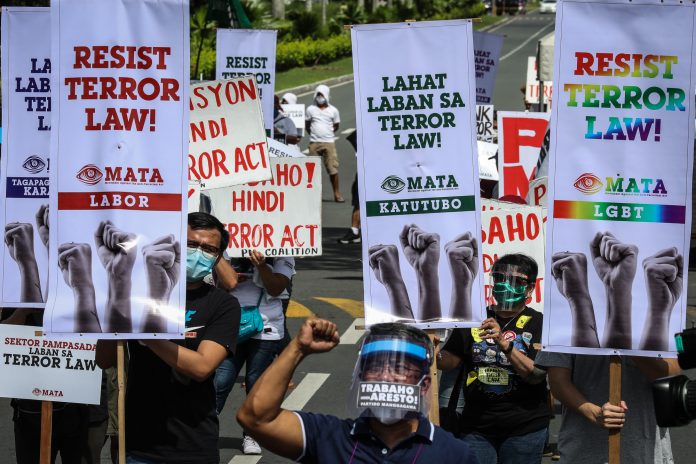Why is it that the more the government gives assurances that the recently signed Anti-Terrorism Act will not violate the Bill of Rights in the 1987 Constitution, nor suppress legitimate dissent, the more citizens fear that it will actually violate their political and civil rights enshrined in the fundamental law, and also target critics and dissenters, not just real terrorists?
Is it just misplaced paranoia on the part of these concerned citizens?
Far from it.
The fear comes from the lack of credibility of those supporting the law.
No less than President Rodrigo Duterte, who pushed for the urgent passage of the measure in Congress by certifying it as a “priority,” recently said: “For the law-abiding citizens of this country, I am addressing you with sincerity: Don’t be afraid if you’re not terrorists.”
But in the same breath, he said: “As they say: ‘Duterte kills here and there.’ That’s true. If you kill people, I will really kill you. You can bet on that on the grave of your father and mother …. If you do that to the people, if you kill them wantonly, then I will take it as a right to kill you.”
That statement is not new. He’s been saying that even during the campaign for the 2016 elections, and the same message has been repeated over and over again on various occasions four years later.
And it’s not an idle threat. The war on drugs has chalked up some 6,000 dead who police claimed fought back during legitimate anti-drug operations.
Human rights groups, however, insist that no less than 20,000 to as high as 30,000 have been killed by suspected vigilante groups in the war on drugs, with authorities saying these are “deaths under investigation.”
After four years, the police have not revealed the results of their probe, and only one case has reached the court.
Sen. Panfilo Lacson, the principal author of the law, has claimed that the crafting of the bill in the Senate was anchored on the Bill of Rights in the 1987 Constitution. “We (were) guided by the Bill of Rights. No law shall be passed abridging the freedom of speech and expression, to peaceably assemble, to air their grievances against the government,” he said.
This assurance, however, sounds hollow given this administration’s dismal track record in upholding human rights, even amid the pandemic: numerous cases of indiscriminate arrest and detention as well as the filing of cases in court against people out in the streets asking for cash and other assistance from the government after losing their jobs.
Early on, during the start of lockdowns to deal with the pandemic, Duterte said the police should not tolerate troublemakers protesting restrictions on mobility and disobeying rules on wearing face masks and maintaining social distancing, and just “shoot them dead.”
With statements like this—and the resulting overzealousness of security forces in enforcing lockdowns—wouldn’t the citizenry be worried sick that the antiterror law could be yet another tool to suppress dissent and freedom of expression, since anyone could face the unwelcome prospect of spending no less than 12 years in jail for “inciting to terrorism”?
The line peddled by rabid supporters of the new law is that “only terrorists should be afraid of the Anti-Terrorism Law.”
Citizens who believe that their civil and political rights would be trampled underfoot by the new law are up in arms against it as they feel that it contains provisions that are unacceptable, such as the vague and all-encompassing definition of a terrorist act, warrantless arrests, and prolonged detention of alleged terrorists.
To them, these provisions do not inspire confidence at all that legitimate dissent and protests in the streets against corruption, bureaucratic inefficiency, and human rights violations would be allowed as part and parcel of respect for fundamental freedoms guaranteed by our Constitution.
No wonder that the new law has met fervent opposition from a broad spectrum of Philippine society: Catholic bishops and church-based groups, former Supreme Court justices, legislators, lawyers, business groups such as the Makati Business Club, labor federations, and international human rights groups, among others.
Should they all be considered terrorists because they fear the ramifications of the new law?
The government should really go all-out against the Abu Sayyaf, Maute Group, Bangsamoro Islamic Freedom Fighters and other groups that have pledged allegiance to the savage Islamic State.
But to use the new law to suppress legitimate demands, arrest and detain those seeking justice, is nothing less than out-and-out State terrorism, and should be resolutely opposed by citizens who want the government to uphold democracy, due process and the rule of law in this country.
Ernesto M. Hilario writes on political and social justice issues for various publications in the Philippines. The views and opinions expressed in this article are those of the author and do not necessarily reflect the official editorial position of LiCAS.news.









